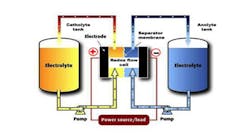As another approach to rechargeable fuel cells, flow battery technology is similar to electrochemical battery cells. Yet the ionic solution (electrolyte) is stored outside the cell. It can then be fed into the cell to generate electricity. (The total amount generated depends on the size of the storage tank.) This approach allows for simple recharging by merely changing out the tanks—but the technology is still rather expensive. Recently, WattJoule Corp. and Battelle entered an agreement to enable the full commercialization of patent-pending, flow-battery electrolyte technology developed by a team at Pacific Northwest National Laboratory (PNNL).
The intellectual-property (IP) license agreement was funded by the Department of Energy’s (DoE) Office of Electricity Delivery and Energy Reliability, Energy Storage Program. PNNL’s electrolyte technology will be used in combination with WattJoule’s high-power stack technology in the building of a core IP strategy. The technology is proposed to fix two critical problems facing current flow batteries. First, it can allow for a greater operating temperature range (up 115%), eliminating the need for an expensive, complex cooling system. It also provides the ability to store more energy in the liquid to reduce volume, footprint, and cost.
The liquid in WattJoule’s product platform is mostly water, making it inexpensive to produce in large quantities. The company also expects the solution to be about 10 times more powerful, for the same volume, compared to commercial battery-flow systems. The flow-battery technology is best suited for storing intermittent, renewable energy on the electric grid. It helps balance supply and demand while preventing disruptions. It also promises to help meet the grid’s varying load requirements.
WattJoule had previously entered another IP licensing agreement with the University of Tennessee Research Foundation. The goal of that agreement is to use the university’s DoE-funded energy storage technology. The company hopes that the first generation of the final product will lower storage costs to $150 per kilowatt hour.
